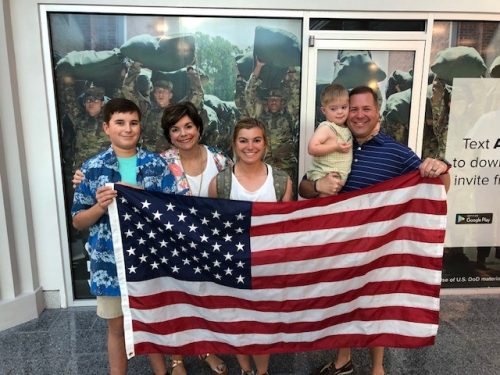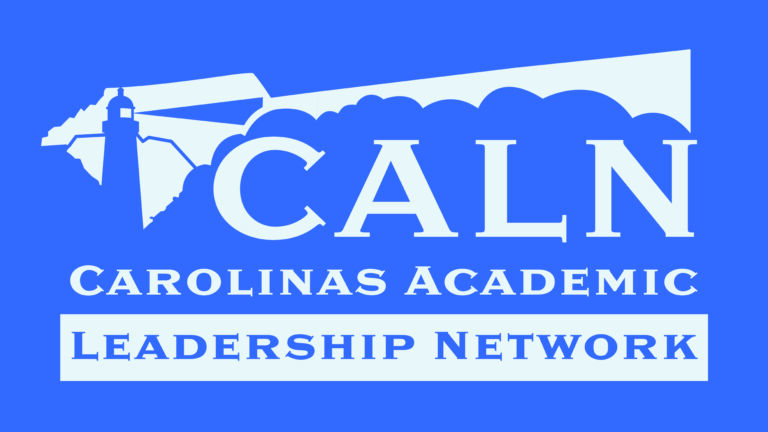Meet Janie Neeley: Mom, Teacher, Advocate
“SAFE Grants have created the opportunity for our family and families like ours to truly have school choice, give our children the chance to succeed and give us the ability to fully support their learning needs.”
Columbia, SC
“I have three children. My oldest is 23. She chose to commission into the army and she’s a Second Lieutenant stationed at Fort Bragg now. My middle son, Tucker, is 16. He has dyslexia and was attending A.C. Flora High School – a public high school here. However, they’re doing 100% virtual instruction and, with dyslexia, the e-learning was extremely difficult for him. So, we made a last-minute decision to move him to Cardinal Newman High School, which is a private Catholic school.
“Our youngest son, Marshall, is four years old and is diagnosed with Down syndrome. He was slated to begin at his local public elementary school but they dropped the ball, and thankfully we were lucky enough to be able to send him to St. Joseph Catholic School for K4.
“Long story short, when I gave notice and registered Marshall to begin in K4, which is the early intervention program, the local public school didn’t even ask to see his IEP (Individualized Education Plan). They did not try to do any assessments, and that was very concerning to us. Then they just suddenly had him registered without any notice or confirmation from us as parents! There’s a lot of legwork beforehand when you have a child with disability – you can’t just show up at the school and say, ‘Tada! We’re here.’
“One week before school started, I said, ‘No, this isn’t how it works.’ We ended up finding him a spot at St. Joseph’s Catholic School through a family friend. St. Joseph’s was expanding their program, due to their commitment to fully embracing life issues, to include children of all disabilities. Marshall is the first child with Down syndrome to attend the school. They had just hired a full-time special education teacher that could bring the necessary support, and we felt confident in the resources they were providing.
“Being at St. Joseph’s these past few weeks has been a tremendous blessing – the school has such a commitment to full inclusion. They’re not teaching him in a separate class, away from his peers. For Marshall, that is critical, because one of his greatest areas of deficit is speech. And the only way that he’s going to improve his speech is by having those peer-to-peer interactions.
“In the past few weeks, as school has started, we’ve watched Marshall’s speech grow tremendously. He’s begun speaking in sentences as opposed to single words at home! That’s a huge gain that I’ve already witnessed, just in this short span of time. The other part for us is the opportunity for Marsh to be in class with his peers all day long. Having the opportunity to take part in the same activities is challenging him.
“He’s picking up things that the other kids are also learning in the general curriculum each week. His school uniform shirt is red and just the other day he pointed to it and said, ‘Red.’ It’s so nice to see that. Being included in a classroom with same age peers that are typically developing peers has been phenomenal for him.
“We’re a single-income family because of Marshall’s medical needs and therapies. We had not budgeted for private school tuition since that was not in our plan. We’re trying to connect the dots now. But it’s not easy because we have two children in private school that need that face to face instruction and we’ve not planned or budgeted for it. It’s stressful.
“COVID-19 has kind of exposed the underbelly of what special needs families have been dealing with in terms of the school districts and their students’ needs not being met. I feel like there’s been access to school choice for people that have the financial capability, but for the average working family that door has not been open. That’s what makes the SAFE Grants so special.
“SAFE Grants create the opportunity for true school choice. When the dollars follow the child and not a system, it opens the door for those smaller schools that want to help and allows them to welcome the families that have not had this opportunity in the past.
“If I didn’t have the capability to send my child to a private school, he would regress. There is absolutely no doubt. In fact, the school district stated that they had plans for student regression. The public school district was looking at four to six hours in front of a computer for virtual learning. Developmentally, that’s just not appropriate for any four-year-old, much less a four-year-old with Down syndrome.
“It would be near impossible to us to do virtual learning – if we could even call it that. He has zero interest in a computer screen. He wants that human interaction. He likes people. He absolutely loved to interact with people before COVID. His favorite thing was when the assisted living bus would pull up.
“COVID-19 has been extremely difficult on him. We saw a difference in Marsh in the spring. He was going to a little church preschool and that abruptly ended in March – he didn’t really understand why. From March all the way through the summer, he went without having another playmate. He’s a very joyful kid. He wakes up happy most days, but during the quarantine, we saw a definite change and a big difference in his emotion wellbeing. We knew he had to have in-person learning this fall.
“My husband is with the Army National Guard and has been activated since April. And he’s been working at COVID sites. I believe in wearing masks. I’m not someone that’s going to say, ‘Don’t take precautions,’ – we don’t go anywhere unnecessarily. But for us, we also knew that this is the beginning of Marsh’s school career and, with his developmental delay, if he didn’t receive that early intervention, my hopes and dreams of him being fully included with his peers were probably going to slip further and further away.
“St. Joseph’s has been fantastic about really individualizing for Marshall a plan that is going to help him be successful as a student and their expectations are extremely high. But I love that because I think students will reach the expectations that you set for them.
“I was a public school teacher and my background was in remedial reading. I used to have a huge commitment of having my children in the public school. But what I’ve found by having three children is that they are very different and diverse in their learning needs, and not every school setting and environment is a good fit for every kid.
“SAFE Grants have created the opportunity for our family and families like ours to truly have school choice, give our children the chance to succeed and give us the ability to fully support their learning needs.”
Featured Image: Janie Neeley, her husband Chris, and their 3 kids.






